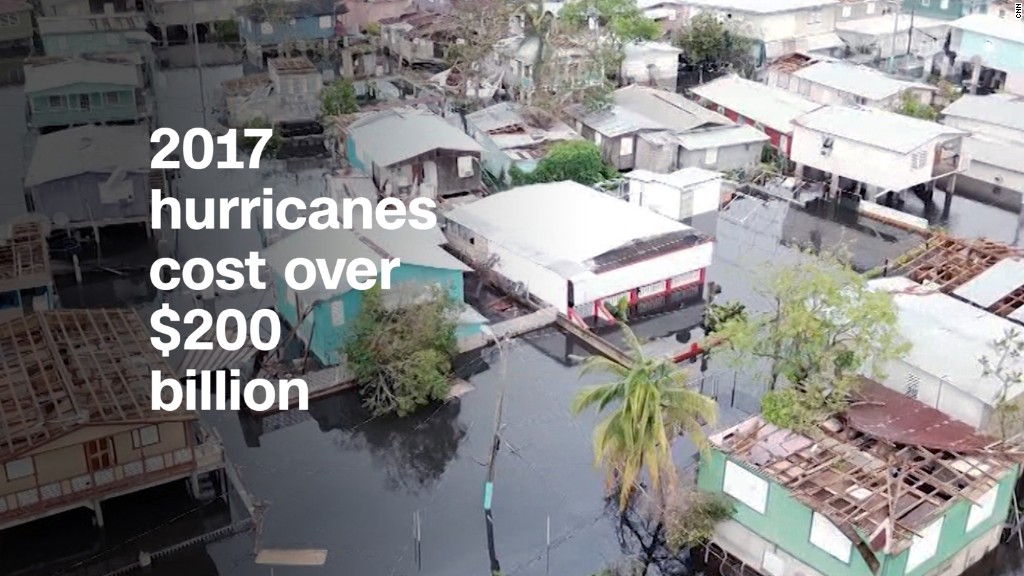
It's easy to forget it's only been six weeks since a megastorm slammed into the Gulf Coast of Texas.
Unless, of course, you live there -- in which case, forgetting is hard.
Life hasn't returned to normal for thousands of Houston residents, and the tasks ahead are daunting.
"We have to be realistic about expectations," says Anna Babin, president and CEO of United Way of Greater Houston, which has hired some 75 new case managers to help storm victims put their lives back together. "No one is going to be the way they were pre-Harvey. We live in a fast food world, and you can't do that with recovery."
Even as enormous piles of moldy drywall and carpet gradually disappear from the sidewalks -- the city estimates it's cleared nearly a million cubic yards of debris, enough to fill 300 Olympic-sized swimming pools -- repairs haven't yet begun on most homes, as residents scramble to line up contractors and find money to pay them. For those counting on a grant or a loan from the federal government, that takes time.
"If you didn't have flood insurance and are relying on FEMA, those guys are way behind in viewing the properties," says Mike Dishberger, a Houston custom home builder who's active in the Greater Houston Builders Association.
Related: Hurricane hit: U.S. lost 33,000 jobs in September
He was able to get his own flooded home fixed up right away, but most people don't have an inside track for hiring construction crews, who already have long waiting lists.
So far, demand for assistance has outpaced federal agencies' ability to respond.
To date, Houston has counted 43,330 single family homes and 3,739 commercial buildings with significant damage. The storm also impacted 14,852 apartment units, according to a survey by the Houston-based company Apartmentdata.com.
The Federal Emergency Management Agency has received 856,003 Harvey-related requests for help and dispensed $921.3 million.
In addition, the Small Business Administration -- which serves as the lender of last resort for the approximately 85 percent of homeowners who didn't have flood insurance -- has received nearly 60,000 applications. About 9,750 of them have been approved, totaling $823 million in loans.
As the weeks wear on, thousands of Houstonians are still living with friends and relatives, or spending money on apartments as rents start to rise. Although the city's major shelters closed in mid-September, 700 people remain in smaller shelters, while non-profits try to find places for them to go. This week, thousands waited in lines for emergency food stamps, the Houston Chronicle reported.
At the moment, the White House is preparing another $29 billion aid package for victims of Hurricanes Harvey, Irma, and Maria. And the state of Texas has given Houston $50 million for Harvey relief, after the city burned through its $100 million flood insurance policy.
Related: Finding a contractor will be tough for Harvey and Irma
But for most people, government assistance won't be enough. And that's where the region's arsenal of private donations will come in handy.
Just to name a few: United Way has raised $42.8 million, the Greater Houston Community Foundation has raised $79 million, and the Rebuild Texas fund has raised $70.1 million. Much of that will be parceled out to families for needs that FEMA won't cover, like replacement furniture or new car tires.
So far, the funds have been cautious in releasing those dollars, to ensure the money goes as far as possible.
"We're not throwing all the private money at everything right away because of the cameras," says Angela Blanchard, president and CEO of BakerRipley, the non-profit that ran the city's largest shelters and is still working with more than 2,000 families. "If you're not going to be careful and thoughtful and deliberate and effective, you're going to have a whole lot of happy people and some people who just lose."
Despite all this, it seems that Harvey has only put a slight wobble in Houston's relentless growth.
In a survey by the Federal Reserve Bank of Dallas, 77 percent of Gulf Coast businesses said Harvey had a negative impact on their revenues, and that they spent an average of 5.1 days shut down.
The Greater Houston Partnership, the region's largest chamber of commerce, estimates that 99 percent of businesses have now reopened. None of the major engines of the city's economy -- the ship channel, the refineries, the airports -- sustained lasting damage.
"The impact we see from Harvey is really short term," says Patrick Jankowski, the Partnership's senior vice president for research. "We'll be down for a month or two, but by the time you get to the first quarter of next year, most of the impact of Harvey will be washed out of the system."


